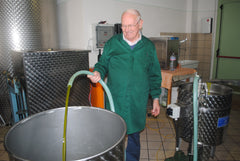The drive from Verona was
picturesque and traveling up the road to Residence San Rocco, I heard a
gentle buzzing noise – louder than an airplane but quieter than a lawn mower. I
got out of my (very fun) rental car and smack dab in the middle of the olive
grove, I saw the first step in what I had traveled to Italy to see – the harvesting and pressing of olive oil at
Frantoio Manestrini. The adventure was about to begin…

A couple of guys were using something that looked like an electric powered rake called a rastrello that gently vibrated and pulled the olives from the trees. Laid out underneath the olive trees were large burlap tarps to catch the fallen olives and I watched as the tarps were gradually maneuvered so the olives collected in the center and were then transferred to large plastic crates called vasche (which is the plural of vasca if you’re interested).


And when I picked up an olive and poked my finger in it, guess
what came out…olive oil! And you want to know what it smelled like? Olive
Oil! This was already pretty cool and I
couldn’t wait to see more.

The crates were moved by a tractor
and brought down the driveway to the frantoio, which is the olive mill/olive
press and sits at the bottom of the hill.
And one by one, each crate was brought inside to start the job of making
olive oil.


The smell inside the frantoio was somewhat pungent and the machines
loud but Paolo and his father Egidio were wonderful guides in the production of
their amazing extra virgin olive oil. Considering olive oil has been made for thousands
of years, the process isn’t much different; it just involves a bit more
technology.
The olives first traveled up a
conveyer belt, which I thought was interesting that they didn’t roll back down
but I guess that’s the technology part.

The next machine had two jobs – it
rinsed the olives with water, and then removed the leaves and since pesticides
aren’t used it was a pretty simple process.
. 
Then they go into the musher
(that’s Italian for the machine that mushes) – okay it’s not called that
but that’s what it does – mashes everything up, olives, skins and pits. The
next step was the separation of the olive oil from the paste-like pulp that
traveled through a plastic hose and voilà – extra virgin olive oil!

Is this a happy guy or what? Signor Egidio Manestrini doing what he loves….
Unfiltered olive oil,
which is cloudy with sediment, has a somewhat stronger taste and doesn’t last
as long as filtered oil, only about 6 months.
Filtered versus unfiltered is a personal preference but it’s so
incredibly natural and unrefined, you just feel like there’s nothing purer on
earth.

My dreams of stomping olives like
Lucy & Ethel did with grapes didn’t pan out which was just as well since it
was rather chilly…maybe next year.














